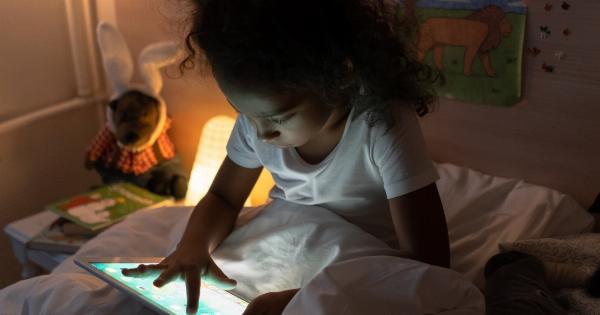It can be a distressing experience for both parents and children when a child suddenly jolts awake with fear or confusion. As a parent, it is important to understand why this might be happening and how to effectively manage these situations.
In this article, we will explore some common reasons behind a child being startled awake and provide helpful strategies to deal with such occurrences.
1. Nightmares and Night Terrors
One of the primary reasons for a child being startled awake is nightmares or night terrors. Nightmares are vivid, scary dreams that can leave a child feeling anxious, frightened, and unwilling to go back to sleep.
Night terrors, on the other hand, are episodes of intense fear that occur during sleep, typically within the first few hours after falling asleep. They can cause the child to scream, cry, or exhibit signs of distress.
To help your child deal with nightmares or night terrors, comfort them and speak in a calm and soothing tone. Reassure them that they are safe and it was just a bad dream. Stay with them until they are calm and can fall back asleep.
Establishing a consistent bedtime routine and creating a calm sleep environment can also reduce the chances of these episodes.
2. Anxiety and Stress
Children, like adults, can experience anxiety and stress, which can disrupt their sleep patterns and cause them to be easily startled awake.
Common triggers for anxiety in children include school-related issues, social pressures, family problems, or changes in their routine or environment.
It is crucial to create a safe and open space for your child to express their worries and fears. Encourage them to talk about what is bothering them and provide reassurance and support.
Engaging in relaxation techniques such as deep breathing exercises or reading a calming book before bed can also help alleviate anxiety and promote better sleep.
3. Sleep Disorders
Some children may suffer from specific sleep disorders that lead to them being startled awake.
Two common examples include sleep apnea (characterized by interrupted breathing during sleep) and restless leg syndrome (a neurological disorder causing uncomfortable sensations and an urge to move the legs).
If you suspect your child has a sleep disorder, it is essential to consult a pediatrician or a sleep specialist.
They can conduct a thorough evaluation and recommend appropriate treatment options to alleviate the symptoms and improve your child’s sleep quality.
4. Sensory Overload
Children have developing senses, and certain environments or stimuli can overwhelm them, causing them to wake up startled. Bright lights, loud noises, uncomfortable room temperature, or irritating fabrics can all contribute to sensory overload.
To minimize sensory overload, create a sleep environment that is conducive to relaxation.
Use blackout curtains to block out excessive light, consider using white noise machines to drown out disruptive sounds, maintain a comfortable room temperature, and dress your child in soft and cozy sleepwear made from breathable fabrics.
5. Physical Discomfort
Physical discomfort can wake a child abruptly from sleep. Factors such as an uncomfortable mattress, itchy pajamas, hunger, or needing to use the bathroom can all contribute to their startle reaction.
Ensure that your child’s mattress is comfortable and supportive. Opt for soft and non-irritating sleepwear to reduce any irritation.
Additionally, make sure they have a light, healthy snack before bed and have used the bathroom to minimize any potential discomfort that may disrupt their sleep.
6. Overstimulation before Bedtime
Engaging in stimulating activities right before bed can make it difficult for children to wind down and fall asleep peacefully.
Activities such as watching television, playing video games, or participating in high-energy play can overstimulate the child’s mind and make it harder for them to transition into a calm and restful state.
Establish a relaxing bedtime routine that involves soothing activities such as reading a book, taking a warm bath, or listening to calming music. Limit screen time at least an hour before bed to allow their minds to prepare for sleep.
7. Reflux or Digestive Issues
Reflux or other digestive issues can cause discomfort during sleep, leading to a startle reaction. Acid reflux, in particular, can cause a burning sensation in the chest or throat, making it challenging for a child to sleep soundly.
If you suspect reflux or other digestive issues, consult a pediatrician. They can recommend dietary changes, medications, or other interventions to alleviate the symptoms and improve your child’s sleep.
8. Inconsistent Bedtime Routine
Having an inconsistent bedtime routine can disrupt a child’s sleep patterns and make them more prone to waking up startled.
Children thrive on predictability and routine, so it is crucial to establish a consistent bedtime routine that they can rely on.
Create a routine that includes calming activities before bed, such as reading together, dimming the lights, or engaging in gentle stretches. Stick to the routine even on weekends or during vacations to maintain stability in their sleep schedule.
9. Fear of Separation
Young children often experience fear and anxiety when separated from their parents or caregivers. This fear can be magnified during sleep when they wake up and find themselves alone in their bedroom.
To address this fear, consider using a night light in their room. You may also place a comfort object, such as a stuffed animal or a blanket, in their bed to provide a sense of security.
Regularly reassure your child that you are nearby and that they can always call for you if needed.
10. Medical Conditions
In some cases, the startle reaction during sleep may be due to an underlying medical condition. Certain conditions like epilepsy or sleep disorders like narcolepsy can cause disruptive nighttime awakenings.
If you suspect that a medical condition is contributing to your child’s startle reactions, consult a healthcare professional. They can evaluate the symptoms, perform necessary tests, and provide appropriate medical guidance or intervention.






























